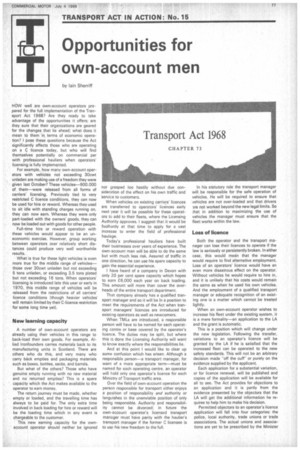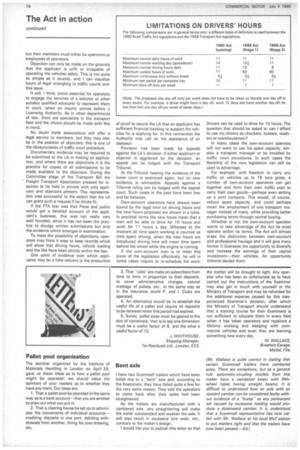Opportunities for own-account men
Page 79

Page 80

If you've noticed an error in this article please click here to report it so we can fix it.
by lain Sherriff HOW well are own-account operators prepared for the full implementation of the Transport Act 1968? Are they ready to take advantage of the opportunities it offers; are they sure that their organizations are geared for the changes that lie ahead; what does it mean to them in terms of economic operation? I pose these questions because the Act significantly affects those who are operating on a C licence today, but who will find themselves potentially on commercial par with professional hauliers when operators' licensing is fully implemented.
For example, how many own-account operators with vehicles not exceeding 30cvvt unladen are making use of a freedom they were given last October? These vehicles-900,000 of, them—were released from all forms of carriers' licensing. Previously tied to very restricted C licence conditions, they can now be used for hire or reward. Whereas they used to sit idle with standing charges running on, they can now earn. Whereas they were only part-loaded with the owners' goods, they can now be loaded out with goods for other people.
Full-time hire or reward operation with these vehicles would appear to be an uneconomic exercise. However, group working between operators over relatively short distances could produce very well worthwhile results.
What is true for these light vehicles is even more true for the middle range of vehicles— those over 30cwt unladen but not exceeding 5 tons unladen, or exceeding 3.5 tans plated but not exceeding 16 tons. When operators' licensing is introduced late this year or early in 1970, this middle range of vehicles will be released from the restrictions of all carriers' licence conditions {though heavier vehicles will remain limited by their C-licence restriction for some long time yet).
New learning capacity
A number of own-account operators are already using their vehicles in this range to back-load their own goods. For example, Allied Ironfounders carries materials back to its manufacturing units in Scotland. There are others who do this, and very many who carry back empties and packaging materials such as boxes, bottles, sacks, and barrels.
But what of the others? Those who have genuine empty running with no raw material and no returned empties? This is a spare capacity which the Act makes available to the operator to earn money.
The return journey must be made, whether empty or loaded, and the travelling time has always to be paid for. The only extra time involved in back loading for hire or reward will be the loading time which in any event is chargeable to the customer.
This new earning capacity for the ownaccount operator should neither be ignored nor grasped too hastily without due consideration of the effect on his own traffic and service to customers.
When vehicles on existing carriers' licences are transferred to operators' licences early next year it will be possible for these operators to add to their fleets, where the Licensing Authority approves. I suggest that it would be foolhardy at that time to apply for a vast increase to enter the field of professional haulage.
Today's professional hauliers have built their businesses over years of experience. The own-account roan will be able to do the same but with much less risk. Assured of traffic in one direction, he can use his spare capacity to gain the essential experience.
I have heard of a company in Devon with only 20 per cent spare capacity which hopes to earn £6,000 each year on back loading. This amount will more than cover the overheads of the entire transport department.
That company already has a qualified transport manager and so it will be in a position to meet the requirements of the Act when transport managers' licences are introduced for existing operators as well as newcomers.
When TMLs are introduced, a responsible person will have to be named for each operating centre or base covered by the operator's licence. The duties may be split, but where this is done the Licensing Authority will want to know exactly where the responsibilities lie.
And at this point I would like to clear up some confusion which has arisen. Although a responsible person—a transport manager, for want of a more appropriate term—must be named•for each operating centre, an operator will hold only one operator's licence for each Ministry of Transport traffic area.
Over the field of own-account operation the person responsible for transport either enjoys a position of responsibility and authority or languishes in the unenviable position of only being responsible. Authority and responsibility cannot be divorced; in future the own-account operator's licensed transport manager must have parity with the haulier's transport manager if the former C licensee is to use his new freedom to the full. In his statutory role the transport manager will be responsible for the safe operation of vehicles. He will be required to ensure that vehicles are not over-loaded and that drivers are not worked beyond the new legal limits. So that in addition to maximizing the use of vehicles the manager must ensure that the fleet works within the law.
Loss of licence
Both the operator and the transport manager can lose their licences to operate if the law is seriously or persistently broken, In either case, this would mean that the manager would require to find alternative employment. Loss of an operators' licence would have an even more disastrous effect on the operator. Without vehicles he would require to hire in, and it is unlikely that his costs would remain the same as when he used his own vehicles. And the employment of a qualified transport manager or adequate recognition of an existing one is a matter which cannot be treated lightly.
When an own-account operator wishes to increase his fleet under the existing system, it is a mere formality—an application to the LA and the grant is automatic.
This is a position which will change under the new legislation. Following the transfer, variations to an operator's licence will be granted by the LA if he is satisfied that the increased fleet can be operated to the new safety standards. This will not be an arbitrary decision made "off the cuffor purely on the evidence supplied by the applicant.
Each application for a substantial variation, or for licence renewal, will be published and copies of the application will be available for all to see. The Act provides for objections to an application and it is partly from the evidence presented by the objectors that the LA will get the additional information he requires to help him to make his decision.
Permitted objectors to an operator's licence application will fall into four categories: the police, local authority, trade unions or trade associations. The actual unions and associations are yet to be prescribed by the Minister but their members must either be operators or employees of operators.
Objection can only be made on the grounds that the applicant is unfit or incapable of operating the vehicles safely. This is not quite as simple as it sounds, and I can visualize hours of legal wrangling in traffic courts over this issue.
It will, I think, prove essential for operators to engage the services of a solicitor or other suitably qualified advocate to represent them in court, when an inquiry comes before a Licensing Authority. As in other departments of law, there are specialists in the transport field and the choice should be made with this in mind.
No doubt trade associations will offer a legal service to members, but they may also be in the position of objectors; this is one of the idiosyncrasies of traffic court procedure.
Documentary evidence may be required to be submitted to the LA in making an application, and where there are objections it is the practice for copies of all submissions to be made available to the objectors. During the Committee stage of the Transport Bill the Freight Transport Association pressed for inquiries to be held in private with only applicant and objectors present. This representation was successful to the extent that the LA can grant such a request if he thinks fit.
If the FTA fear was that Press and public would get a detailed account of the applicant's business, this was not really very well founded, since it has not been the practice to divulge written submissions but only the evidence which emerges in examination.
To meet the possibility of objections, operators may think it wise to keep records which will show that driving hours, vehicle loading and the like have been strictly within the law.
One point of evidence over which applicants may be a little reticent is the production of proof to assure the LA that an applicant has sufficient financial backing to support the veh icles he is applying for. In this connection the Authority may call on the assistance of an assessor.
Provision has been made for appeals against the LA's decision. If either applicant or objector is aggrieved by the decision, an appeal can be lodged with the Transport Tribunal.
At the Tribunal hearing the evidence of the lower court is examined again, but no new evidence is admissible. Appeals against a Tribunal ruling can be lodged with the appeal court. Such cases in the past have been few and far between.
Own-account operators have always been bound by the legal limit on driving hours and the new hours proposed are shown in a table. In practical terms the new hours mean that a man will be able to drive for 10 hours and work for 11 hours a day. Whereas at the moment all time spent working is counted as time spent driving, when the new hours are introduced driving time will mean time spent behind the wheel while the engine is running.
If the own-account man is to meet this piece of the legislation effectively, he will in some cases require to re-schedule his work. Drivers can be used to drive for 10 hours. The question that should be asked is: can I afford to use my drivers as checkers, loaders, washers or warehousemen?
In many cases the own-account operator, will not want to use his spare capacity, employ a transport manager or be troubled by traffic court procedures. In such cases the flexibility of the new legislation can still be used to advantage.
For example, with freedom to carry any traffic on vehicles up to 16 tons gross, a number of own-account operators can get together and form their own traffic pool to carry their own goods—perhaps even setting up a joint company. This would, of course, reduce spare capacity, and could perhaps mean the employment of one transport manager instead of many, while providing better purchasing terms through central buying.
Whether or not the own-account operator wants to take advantage of the Act he must operate within its terms. The Act will almost erase the distinction between own-account and professional haulage and it will give many former C-licensees the opportunity to diversify and increase the earnings of their capital investment—their vehicles. An opportunity hitherto denied them.




























































































































































